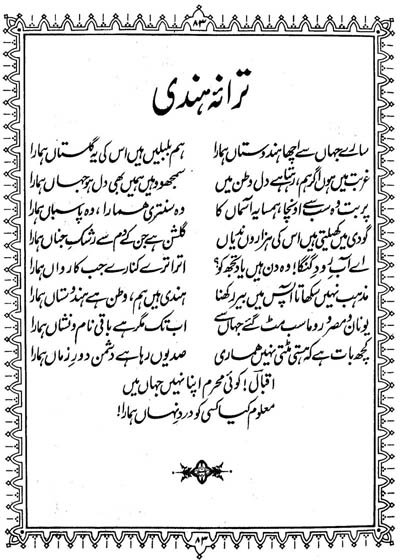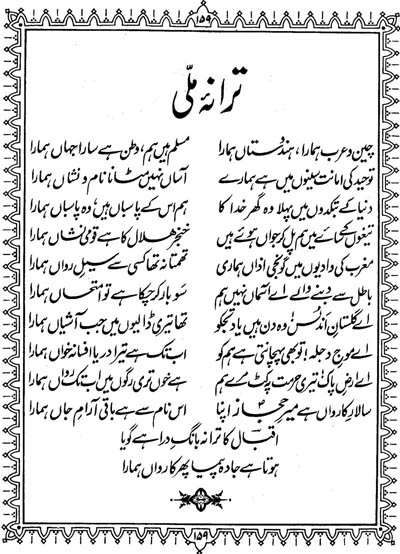A study in contrasts...
 |
 |
A study in contrasts...
 |
 |
'Taranah-e Hindi' (1904) was explicitly written as a patriotic song for children; Iqbal also composed a number of others meant for children, but this one has always been the most popular. This little ghazal, composed by the man widely considered to be the philosophical father of Pakistan, is now extremely popular-- but only in India.
Some verses of 'Tarannah-e Hindi'-- (1), (3), (4), and (6) -- are nowadays widely sung in India, as a kind of short unofficial national song. This song is also the official quick march of the Indian armed forces [site].
In 1984, Squadron Leader Rakesh Sharma became the first Indian in space. On a live TV broadcast, Prime Minister Indira Gandhi asked him, in Hindi, how India looked from outer space. He replied, 'Sare jahan se accha' [site].
In 2004, a special ceremony was held in Gorakhpur to mark the centenary of 'Taranah-e Hindi' [site]: 'Former head of Gorakhpur University’s Urdu department, Prof. Ahmar Lari, said that Iqbal wrote this patriotic poem in August 1904 and it was first published in Abdul Haleem Sharar’s weekly journal Ittehad on 16 August 1904. However, Iqbal himself sent the authoritative version of his poem to Munshi Daya Narayen Nigam who published it in his monthly Zamana (Kanpur) in September 1904 issue.'
Jan. 5, 2005, K. Natwar Singh said in a thoughtful speech: 'His Tarana-e-Hindi resounds in our ears day after day. But his poem "Naya Shivala" (New Temple) sets out his views most powerfully.
My heart was sick: I turned away both from the temple and the Ka'bah, / From the sermons of the preacher and from thy fairy tales, O Brahman.
To Thee images of stone embody the divine -- / For me, every particle of my country's dust is a deity.
Come, let us remove all that causes estrangement, / Let us reconcile those that have turned away from each other, remove all signs of division.'[He goes on to speak of the 'composite culture' and challenges to it.] [site]
By contrast, 'Taranah-e Milli' (1910) seems to received much less attention. I've never heard anyone sing or even recite it, and until I came upon it in Iqbal's kulliyāt I had no idea that it existed. But that may just reflect my own lack of exposure. In any case, the two together obviously have a story to tell, about the direction of Iqbal's thought over time. I'm going to keep an eye out for references to either one.